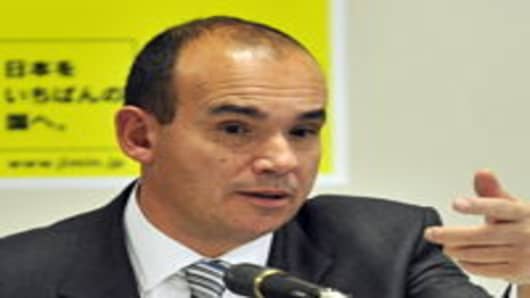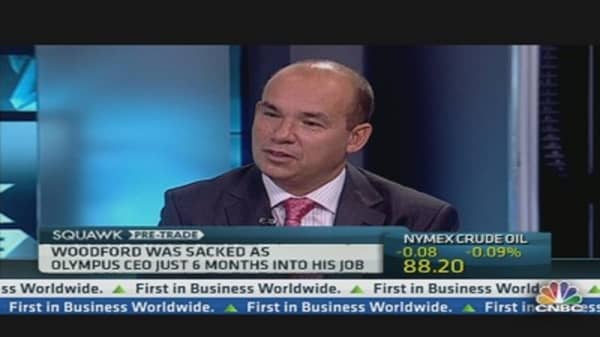Japan has a miserable future ahead of it without radical changes to the business climate, the former chief executive of camera and medical equipment maker Olympus has told CNBC.
Michael Woodford, who was fired in October 2011 after he highlighted irregular payments made by the firm, said a poor business attitude and ethos is endemic throughout Japan.
"There's a great engineering class in Japan but there's a lousy management class," he said. "They're bureaucrats, they don't understand the basics of business, closing what's weak and investing in what's strong."
Woodford, who settled his claim for unfair dismissal back in June, is about to publish a book, "Exposure: Inside the Olympus Scandal: How I Went from CEO to Whistleblower."
Japan's demographics are notoriously skewed towards an aging population. It may be the world's third largest economy but its people are growing old at a faster rate than any other country in the world. Nearly a quarter of the population is above the age of 65 according to World Bank data, and the country has a negative birth rate.
"How are they going to pay that down? I would short Japan," he said.
Woodford, who said he is still a huge admirer of the country, has devoted himself to spreading the message that Japan needs to clean up its act if doesn't want to see a "terrible decline and demise." Japan's debt-to-GDP ratio currently lies at around 230 percent after several decades of stagnation, a figure that's the highest in the world, dwarfing that of Greece and the U.S.
(Read More: Can Japan's Elderly Become Its Growth Engine?)
"At the moment the world is preoccupied with the euro crisis and the fiscal deficit in the U.S., but the dog will be howling when Japan starts to tumble and already there are a lot of signs," Woodford said.
He said that a government drive to make sure firms had external directors had been rejected by businesses. Corporate Japan also has a tendency to use lower tier audit firms, and not the "Big Four" which should raise red flags, according to Woodford.
"Out of the 1,600 companies on the Nikkei, over 1,000 don't have one external director? What are they afraid of? What are they scared of?" he said.
There was also a tendency for Japanese banks to lend to "zombie companies" — a firm which is generating just enough cash to cover its debts — despite their junk status, he said.
Olympus initially denied any wrongdoing after the allegations by the former CEO, but the firm eventually admitted to hiding $1.7 billion of losses over the last 20 years. Shares fell by 81 percent after the scandal hit the headlines, but major institutional shareholders still didn't criticize the management, according to Woodford. He described the corporate culture as an "incestuous club" and says potential investors should treat Japan with caution.
(Read More: Olympus Former Executives Plead Guilty in Scandal Trial)
"They can't manage Westerners, they can't manage people like me. They can't fire people normally," he said. "They don't promote young people and women. There are no women in middle management, never mind in senior management."
Patrick Perret-Green, former Citigroup head of Asian currency and rates strategy, previously worked for two Japanese firms. Speaking to CNBC.com he said that the problem lies in the fact that the buck doesn't seem to stop with anyone in Japanese business culture.
He sees the only salvation available for Japan being a complete cultural and social revolution.
"A classic example is the role and status of women in Japanese society. They are ridiculously underutilised," he said. "In most advanced economies women account for roughly 40 percent of managers. In Japan it is about 10 percent. That waste of resources is profoundly negative."
—By CNBC.com's Matt Clinch




